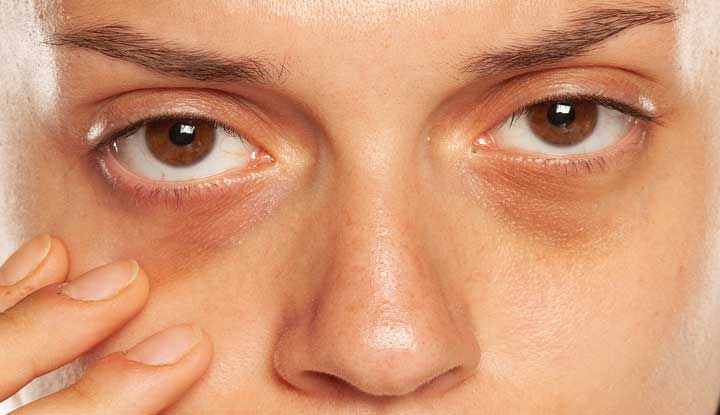Most exhausting time of the year
This time of year can be particularly stressful and busy with lots of social engagements, hosting commitments, and late nights all round. Although many of us have a bit of extra time off work around this time of year, our days – and nights! – are often filled with other obligations leaving us with less time than we’d usually have. In busy periods, the first thing we often sacrifice is sleep. We all know that sleeping less leaves us feeling lethargic and irritable, without much energy. We’re probably also all aware that a lack of sleep is very visible on our faces in terms of under eye bags and dark circles. These mainly make an appearance in periods of high stress and little sleep, but can actually occur for a number of reasons.
Top triggers for dark under eye circles:
- Fatigue
- Age
- Exposure to screens
- Genetic factors
- Allergies
- Dehydration
- Sun exposure
- Smoking
- Anaemia
- Thyroid conditions
- Bone structure
- Makeup irritations
- Facial eczema
- Sleeping on your front
- Excess of salt and caffeine
Obviously, fatigue is the number one cause for developing dark circles under your eyes, leaving you with that easily-recognisable “I didn’t get enough sleep last night” look. This is because a lack of sleep allows fluid to build below your eyes, creating a puffy look underneath the thin under-eye skin. As the skin under your eyes is so delicate and thin, dark tissues and blood vessels are sometimes visible through it. These tissues swell when you haven’t slept enough, meaning they show through the skin even more. The blood vessels under your eyes also become more visible with age, so the older you get, the more you might start to notice your under-eye dark circles.
We’ve written previously about the damage staring at screens all day can do to your vision, but did you know that it can also contribute to darker circles and bigger eye bags? This is because your eyes strain to focus on the screen, putting pressure on the surrounding blood vessels. Again, much like with the effects of a lack of sleep, the blood vessels then enlarge and become more visible through the skin. To combat this, experts suggest looking away from your screen every now and then to relax your eyes and help them somewhat recover.
Genetics also play an important role in deciding how susceptible you are to noticeable under-eye bags. Research shows that, sadly, this can be inherited from your parents and is particularly common in people from certain backgrounds such as Mediterranean. The pigmentation around the eyes is sometimes just darker in some people and, like with many other physical characteristics, this is passed down through the generations. Similarly, your facial bone structure is also determined by genetics and this can be a contributing factor for noticeable eye bags. Some people have deep tear troughs under their eyes, casting shadows which accentuate their dark circles. Unfortunately, there isn’t a lot you can do about the shape of your face but fillers are available to lessen the under-eye shadow created by this problem.
Allergies can worsen the appearance of dark circles under your eyes too. When you have an allergic reaction, your body reacts by releasing histamines to battle the bacteria. These histamines can cause the blood vessels around your eyes to dilate, showing more noticeably through the thin skin under your eyes. Allergies can also make your eyes feel itchy, leading you to scratch or rub them, again aggravating blood vessels. Occasionally, you might have a bad reaction to some eye makeup, further contributing to itchy, swollen eyes. This is the same for eczema, a medical skin condition which can be triggered by a number of factors. Eczema causes skin to become itchy and, if it affects the areas surrounding your eyes, it may have a similar effect on dark circles to allergies. Rubbing your eyes when they’re itchy can lead to swelling and broken blood vessels, worsening the appearance of your under eyes.
Dehydration is another common cause of dark under eye circles. The skin around your eyes relies on water to fill it out and keep the area looking healthy. If you’re not drinking enough, the skin shrinks closer to the bone in your face, creating more of a gaunt look and accentuating any eye bags. This contrasts with how thyroid disease can contribute to dark circles – thyroid disease promotes fluid retention, particularly around the eyes, pulling down on the skin below your eyes to create bags.
Exposure to the sun is one thing you might not even realise contributes to dark under eye circles. The skin under our eyes is the thinnest in our body so when it’s damaged by the sun, it’s particularly noticeable. Sun damage in this area dilates your blood vessels and increases blood flow under the eyes, creating dark circles. Wearing UV protection sunglasses and using SPF should help in these situations although, as the skin is so delicate, you must take care when applying it. Sun exposure also encourages melanin production, darkening areas that have been exposed for long periods. As under eye skin is so thin, this area is at even higher risk.
Bizarrely, something which multiple sources cite as creating eye bags and contributing to dark circles is sleeping on your front or side. While this might sound like a really obscure part of your lifestyle when it comes to eye health, the explanation does actually make sense. When we sleep on our front or side, our faces fold into the pillow. This pushes the skin on our face – and around our eyes – into positions where it normally wouldn’t be, often staying like that for hours at a time. This makes it easier for wrinkles to form, as well as worsening eye bags.
How to reduce under eye dark circles
The simplest, quickest way to reduce under eye bags and dark circles is to apply a cold compress. It helps to reduce swelling and shrinks the dilated blood vessels around the eyes, minimising the appearance of under eye circles. Another common solution is simply just to get more sleep. We’ve written previously about the benefits of sleeping for your eye health, and this extends to reducing the appearance of puffy, tired eyes.
For some people, however, cold compresses and an extra hour in bed won’t make much difference to their under eye dark circles. Some people, particularly those whose eye sockets are deeper than usual, might benefit from tissue fillers. This pads out the area below the eye and leaves the skin looking less sunken, achieving a more lifted appearance.

